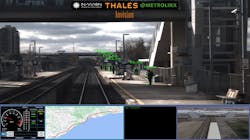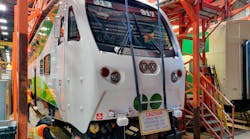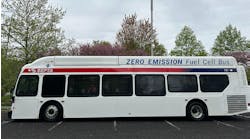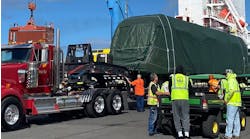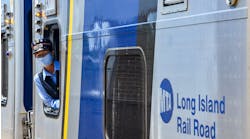An 18-month program to develop all-weather, advanced autonomous technologies for rail systems has concluded. The WinterTech Program’s partners – Invision AI, Thales and Metrolinx – say the project marks an important milestone towards train autonomy globally.
The C$1.48-million (US$1.17-million) project was funded through contributions of the partners that total more than $C992,000 (US$790,177), as well as C$483,600 (US$385,211) from the government of Ontario through the AVIN’s WinterTech Development program. The WinterTech program supports small and medium-sized enterprises and their partners by commercializing winter-ready innovative mobility solutions. Project stakeholders explain this project positions Canada to be the first to introduce advanced driver assistance and autonomous technologies that can function in all weather conditions.
“The partnership between Metrolinx, Thales and Invision AI has put Ontario on the map as a leader in developing connected and automated transportation technologies,” said Ontario Minister of Transportation Caroline Mulroney. “Through AVIN's WinterTech Development program, this team has shown the benefits of embracing these exciting new technologies to keep people moving safely on transit with fewer delays regardless of weather conditions. Together, we are transforming the way people travel across the province.”
A Metrolinx GO train was equipped with the system in January 2021 and successfully operated in shadow mode on multiple lines in Toronto, collecting data from various sensors, including radars, cameras and lidar, powered by cyber-secured 4G/LTE capabilities. This data was used to teach the system to recognize obstacles and other hazards in all weather conditions. In a March update on the project, it was reported the technology on the train was providing real-time information and data – such as next generation positioning, train telemetry and diagnostics information – to ensure the system is running smoothly.
“The team at Invision AI is incredibly excited by the opportunity to develop a high-integrity train situational awareness system together with Thales, Metrolinx,” said Invision AI CEO Karim Ali. “We brought together the partners with the software, hardware and operational expertise to build an autonomous rail system capable of withstanding our harsh Canadian winter. We are proud to be setting a strong foundation for rail autonomy and solving global challenges right here in Ontario.”
The partners explain the benefits of this new solution for rail transit operators include enhanced safety through sensors detecting and tracking potential obstacles, rapid installation time due to the minimal equipment footprint and accurate real-time data collection crucial for maintenance and operations teams. The partners say passengers can expect fewer delays, improved safety and enhanced reliability of the network with the system.
Additionally, the modular solution can support further upgrades. It can be combined with smart monitoring systems at grade crossings and stations to provide further safety enhancements by enabling beyond-line-of-sight reactions for approaching trains.
“A focus on safety is central to delivering a world class transit system, and innovative solutions like this one are an important part of this work,” said Metrolinx CEO Phil Verster.
Thales Canada CEO Chris Pogue added, “The WinterTech project demonstrates the tremendous value that partnerships with start-ups and SMBs can deliver for Ontario. By bringing together our unique technological capabilities, together we are offering valuable made-in-Ontario solutions to our customers.”
